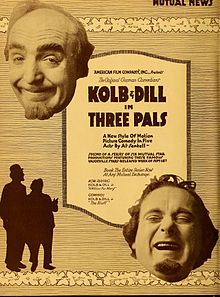Clarence Kolb
Clarence William Kolb (born July 31, 1874 in Cleveland , Ohio , † November 25, 1964 in Hollywood , California ) was an American film and stage actor.
life and career
Clarence Kolb began his show career before the turn of the century on vaudeville stages. With the comedian Max Dill (1876-1949) he formed a comedian duo between 1904 and 1931 , which performed particularly successfully in California. They were best known for imitating Dutch dialects. They also made some silent films together between 1916 and 1917 , but quickly returned to the stage.
From the mid-1930s, Kolb turned mainly to Hollywood cinema. The tall, now white-haired Kolb specialized primarily in portraying rich or powerful, often easily angry business people or politicians in supporting roles. In the comedy How do we live happily! (1939) he played the father of Constance Bennett and was able to prove his acrobatic skills from the vaudeville days in a scene in which his character stumbles drunk on a staircase. In 1940, Kolb played the corrupt mayor in the Cary Grant comedy His Girl for Special Occasions, directed by Howard Hawks . From the 1950s he was also seen as an actor on the US television that was just becoming popular. In the hit sitcom My Little Margie , he played Mr. Honeywell , the choleric boss of lead actor Charles Farrell .
He made his last appearance in 1957 in the biopic The Man with the 1000 Faces about the life of his companion Lon Chaney senior , in which he embodies himself at the side of James Cagney . Clarence Kolb died in 1964 at the age of 90; he was survived by his wife Mabel.
Filmography (selection)
- 1916: A Million for Mary
- 1927: Two Flaming Youths
- 1936: Blind Fury (Fury)
- 1936: Thin Man, 2nd Case (After the Thin Man)
- 1937: Cross-examined (Maid of Salem)
- 1937: Portia on Trial
- 1937: Frisco Express (Wells Fargo)
- 1938: Carefree by Dr. Flagg - Carefree (Carefree)
- 1938: Golden Earth California (Gold Is Where You Find It)
- 1939: South Seas Nights (Honolulu)
- 1939: How do we live happily! (Merrily We Live)
- 1940: No Time for Comedy (No Time For Comedy)
- 1940: His Girl Friday (His Girl Friday)
- 1941: Terror of the Second Company (You're in the Army Now)
- 1941: The devil breaks loose in hell! (Hellzapoppin ')
- 1944: Three Is a Family
- 1944: Standing Room Only
- 1944: Irish Eyes Are Smiling
- 1946: The hero of the day (The Kid from Brooklyn)
- 1949: Marriage War (Adam's Rib)
- 1952–1955: My Little Margie (TV series, 70 episodes)
- 1957: The man with 1,000 faces (Man of a Thousand Faces)
Web links
- Clarence Kolb in the Internet Movie Database (English)
Individual evidence
- ^ Obituary for Clarence Kolb in the New York Times
- ↑ Clarence Kolb at Allmovie
- ^ Obituary for Clarence Kolb in the New York Times
| personal data | |
|---|---|
| SURNAME | Kolb, Clarence |
| ALTERNATIVE NAMES | Kolb, Clarence William (full name) |
| BRIEF DESCRIPTION | American theater and film actor |
| DATE OF BIRTH | July 31, 1874 |
| PLACE OF BIRTH | Cleveland , Ohio |
| DATE OF DEATH | November 25, 1964 |
| Place of death | Hollywood , California |

